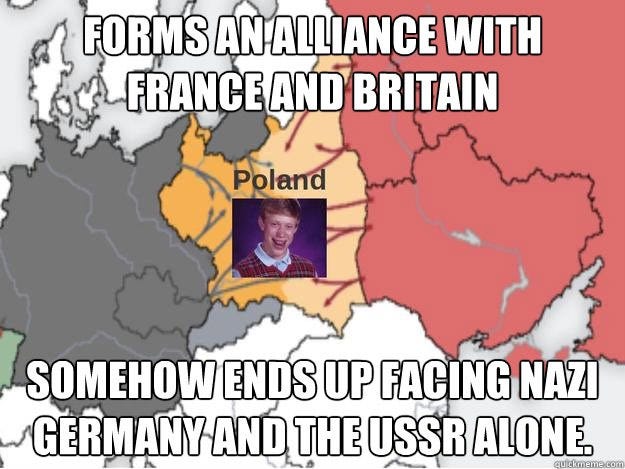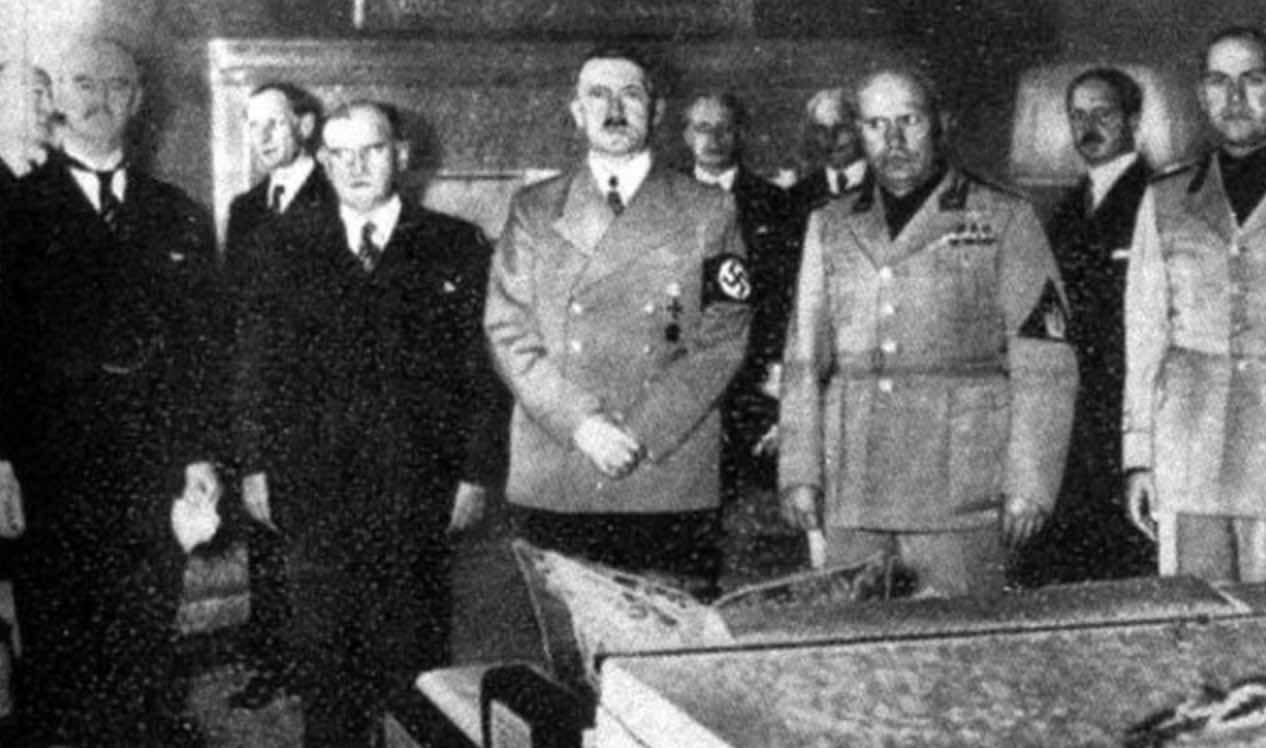The Western Betrayal or why die for Danzig
Just deliver Donbas/Sudetenland to this guy if he wants it so much...
I pay so much attention to pro-Russian Russians, I feel I neglect the lot that is even weirder: pro-Russian Americans. But I read them, too - for instance, Chris Hedges.
Quote from Chris Hedges (via ScheerPost)
Since he took money from Russia Today, I find it hard to believe he is acting in good faith. But let’s assume that he does for conversation sake.
Above you will find a quote from his latest pro-Russian rant. What I find particularly interesting is his comparison to Vietnam and Iraq.
In the early days of this substack, I wrote a post about how important our history is to us in Eastern Europe. We put disproportionate attention to what happened to “our” nation in Middle Ages and I’m the first to agree this is probably going too far, but here I am, unable to resist this urge.
What I find interesting in this context is - acting in good faith or not - goes definitely not far enough. He seems to remember only the historical events that happened in his lifetime. He was 19 when the last helicopter took off the embassy rooftop in Saigon.
I would say that this is typical for Westerners, at least Americans. If they build “historical analogies”, they usually refer to something that happened 20, 30, at best 50 years ago.
This war is being fought by people with a broader scope of historical context ON BOTH SIDES. This is something you simply have to take into account regardless if you are “pro Putin” or “pro NATO”, “true neutral” or “chaotic good”.
When I read Russian blogs and media, they are full of analogies with World War II, sometimes mixed with references to the Russian civil war of 1917-1923 and the Crimean war of 1853-1856. In all these instances, the question “how to advance from Kherson to Crimea” (or vice versa) was also a key issue.
Let me just stick to the WW2 - in spite of everything that happened after 1945, we still see it as the most important event in recent history. After all, our borders were largely drawn in 1945 (with minor modifications).
You can’t get Eastern Europe if you don’t understand that in the first place. World War Two analogies are EVERYWHERE, from politics to popular culture. Even if our authors imagine fantasy neverlands or space opera galactic empires, the main scope of conflict is usually surprisingly similar to “Axis vs Allieds vs Comintern”.
Yennefer of Vengerberg, your very Eastern European sorceress (Netflix publicity shoot)
Case in point: “The Witcher” franchise. The political backdrop to this fantasy saga is a war on the imaginary Continent, where the totalitarian empire of Nilfgaard is conquering the “kingdoms of the North”.
Nilfgaard is unable to do it by military power alone, because the Northern kingdoms are stronger. On paper. But the shrewd Emperor Emhyr is playing the Northern kings for fools, sowing discontent among them, and just taking them one by one.
The Netflix adaptation has just reached the part of the book saga when the Continent mages, led by sorceress Yennefer of Vengerberg, try to arrange a Northern alliance. Technically it’s a spoiler, but it should be no surprise to you that this attempt will be a colossal failure.
This is a very Eastern European story. While the West is seeing World War Two as the triumph of allied democracies fighting the evil empire of Third Reich, our memories are different. We remember facing Hitler and Stalin in horrible solitude.
That’s how we remember it in Poland, but judging from the books I have read, there is a similar sentiment in Czech, Romanian, even Hungarian literature (e.g. Sandor Marai). This is especially surprising when you read memoirs from countries that made the deal with the devil and joined the Axis - at the time it was not perceived as something to be happy about, but as the lesser evil that would not be necessary if not for the “Western betrayal”.
While we all here perceive it slightly differently, the concept of “Western betrayal” will be easily understood in every country from Finland to Greece. I will use the meme below as an example of this misunderstanding.
Seems suicidal… but was it? (assumed public domain)
Yes, why did Poland choose to ally with France and Britain? It makes sense if you look at the broader context of the entire interwar period. Let’s begin with the Paris Peace Conference of 1919-1920, establishing the interwar European order.
As a result of the Paris treaties, multiple news states emerged on the map, from Finland to Yugoslavia. Most of them were carved from former German, Austro-Hungarian or Russian lands and as such they were in immediate threat by the great power revanchism as well as by your neighbour next door (next mountain), because the process of drawing new borders caused a lot of new border conflicts.
Western diplomats knew about it and they established a mechanism they hoped will be strong enough to prevent the next war forever. In reality, it did not last even for 20 years, but if you look at Europe in - say - 1930, it still seems pretty solid.
Europe as emerged from the Paris Peace Conferences - George Bacon, public domain (via Wikipedia)
The new countries formed an alliance called Little Entente - under the auspices of France. France guaranteed Little Entente and its members guaranteed each other. It was almost like the alliance Yennefer of Vanderberg tried to build in the Witcher saga… but there was one catch. Or maybe two.
First: two Eastern European countries were on the wrong side of World War I, and for this they were punished by sanctions, reparations and unfavorable border changes. They were Bulgaria and Hungary.
Both countries felt that this punishment was unjustified. As for Hungary, they did not enter World War I on their own accord. As a junior partner in the Austro-Hungarian union, they had nothing to say. They felt they don’t deserve to be treated like the culprits of the WWI, they were the victims forced to participate.
So did Bulgarians. They tried to remain neutral, but both sides (Axis and Allied) made it clear they will not respect neutrality and Bulgaria will be crushed by both sides should it refuse to join one of them. In 1915 they reluctantly joined the Central Powers, because Russian conditions for joining entente were murderous.
So even at the very beginning of the interwar period, we had two Eastern countries despising this system. To make things worse, there were countries such as Poland or Lithuania, generally happy with the Versailles treaty, but unhappy about the borders they ended up with - Poland snatched Vilnius from Lithuania, while Czechoslovakia did so with Zaolzie.
Therefore Poland and Czechoslovakia perceived each other as enemies, so they could not be in the Little Entente together. But no worries! There was Romania, who had no conflict with Poland, so there was a separate bilateral treaty of mutual protection.
Technically someone who attacked Czechoslovakia should end up in war with Romania, who could in turn ask their trusted ally - Poland, for help. All these countries were guaranteed by France, who enjoyed cordial alliance with Britain.
So if you look at the map in 1936, it seems that Hitler and Stalin are paper tigers. They can do nothing without triggering a full scale war with the victors of the Great War, Britain and France and the combined Polish, Czechoslovakian, Yugoslavian and Romanian armies (looking pretty strong on paper).
As Hitler’s rhetoric became more and more belligerent, countries of Eastern Europe started to fortify their borders. Czechoslovakia built a system of bunkers in Sudetenland, Romania protected itself from Hungary with a King Michaels Line, Poland fortified the German border, and France created the world famous Maginot Line.
If it was so good, how could things go so wrong? Why did World War Two happen at all?
This rock-solid system started to collapse with the Anschluss of Austria in March 1938. It was a direct violation of the Paris Peace Treaties, but the world did nothing. After all, they spoke the same language, and they seemed to be happy about it (maybe except the Austrian Jews, but after all you can’t please everyone, can you?).
Now the borders of Czechoslovakia started to look hopeless. The most populated and developed “head” of the country was surrounded by Germany from three sides, and the less populated “tail” was squeezed between two hostile countries, Poland and Hungary. In case of war it would be impossible to maintain the land corridor to Romania.
In September 1938 Hitler demanded Sudetenland. He said he has no more territorial claims in Europe, but it is his duty to protect the German speaking population.
In his famous speech in Sportpalast on September 26th, Hitler presented himself as the biggest pacifist in Europe, trying to merely to sign just and fair treaties with his friendly neighbours, while the English and French “warmongers” provoke war in Europe. However, by taking Sudetenland he made it certain there will be no war “at least in 10 years”.
Neville Chamberlain, Edouard Daladier, Adolf Hitler and Benito Mussolini assuring each other that it is all about German-speaking population of Czechoslovakia and nothing else (public domain, author unknown)
Of course, when Czechoslovakia “agreed” to give up its fortified border areas, it was virtually disarmed. In March 1939 Hitler took the rest of the country and in an act of insane political myopia, Poland snatched Zaolzie back.
But now Hitler had the gold reserves of the Czechoslovakian national bank, the industrial power of Skoda and Zbrojovka Brno, and crucially, tanks and guns from the once powerful Czechoslovak army. They were soon to be used to crush Poland and France, who handed them over to their enemy on a silver plate, accelerating their own undoing.
Now Polish borders were impossible to defend. In spite of that, we were the first country to say “no” to Hitler and Stalin. We paid such a horrible price for this that the when it was the turn for Romania, they did not want to repeat this mistake, they just handed over their fortified border areas to Hungary and Soviet Union. Now they were helpless and thus have no other option but to join Axis, the easy way or the hard way.
By mid-1941, all the countries in Eastern Europe were either annexed by Hitler or Stalin, or at best vasalised. And what is most horrible is that they took us one by one, while we could have won, if acting as united in 1938.
There is a proverb saying that nobody ever learned anything from history, but I think war in Ukraine proves otherwise. Everybody in Eastern Europe remembers how stupid it was to deliver Sudetenland to Hitler.
We know that if Ukraine submits to Russian demands, it will not bring “10 years of peace”. On the contrary, it will make the next war inevitable.
We see no similarity to “Vietnam, Iraq and Libia”, but a lot of similarities with the collapse of Paris Peace Treaties in 1938-1940. Actually, if you look closer to Chris Hedges’ line of reasoning, he talks much like Hitler in Sportpalast. He is blaming some undefined “war pimps” or “warmongers” on the West, with complete disregard for the interest of Eastern European nations.
All the Eastern European nations (including Greece and Finland!) have their own version of the “Western betrayal”. But at some point between 1938 and 1941, we were indeed betrayed by the people in the West saying “why die for Austria, why die for Sudetenland, why die for Danzig”. Pretty soon they had to die for London, but in much worse conditions.
This is why Eastern Europe, with all our internal struggles and differences, is nearly unanimous in this matter. It doesn’t matter if you are left or right, progressive or conservative, Polish, Lithuanian or Romanian, you know appeasement does not work. The recent history of your own country is full of evidence.









From today's perspective, polish actions in 1938/39 were really stupid. Besides Zaolzie, we were busy with helping Hungary to take Carpathian Ruthenia (Zakarpacie) with diversions and military actions. Polish government was acting like there was no threat from Nazi Germany or USSR and Czechoslovakia was our biggest enemy.
"First: two Eastern European countries were on the wrong side of World War Two"
I think this is a typo: it obviously relates to World War I.